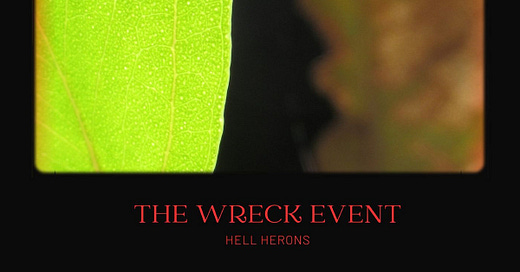These notes on The Wreck Event follow on from this essay and this video, both of which deal with the subject of combining spoken word performance with music.
The Wreck Event is a recently released album by spoken word and music collective, Hell Herons, which group comprises four award-winning poets and writers: Melinda Smith, CJ Bowerbird, Stuart Barnes, and Nigel Featherstone, hailing variously from Queensland, New South Wales, and the ACT.
Incidentally, Tasmanian-born Barnes’ collection Like to the Lark was published by Western Australia’s Upswell Publishing in 2023. Barnes performs three poems from that collection, Off-World Ghazal, The morning fog and Duplex, on The Wreck Event.
The works on this album - all the poems are set to Nigel Featherstone’s original music, which he performs - share a striking power and intimacy, no doubt partly due to the fact that the close-miked poems were recorded in Featherstone’s closet!
(Kimmo Vennonen of kv productions in Canberra was responsible for the vocal re-recording, mixing, and mastering, as well as contributing additional elements of noise manipulation to enhance the album’s sonic landscape.)
Ludic and stochastic elements fed into a creative process which the group describe as organic and experimental, with no predetermined plan and plenty of “play, risk-taking and the pursuit of artistic goosebumps”. Additionally, The Wreck Event represents the fruits of a classic lockdown project, and many of the poems reference feelings of isolation and captivity.
The diversity of styles and subject matter is however much broader than that, the 16 tracks combining Featherstone’s sometimes sinewy, sometimes subtle but always apposite music with lyrics and lyricism of a paradoxically universalising haecceity that is fresh and refreshing.
(For the purposes of clarity and concision, the following quotations do not always observe the poems’ original lineation.)
You’ll notice how musical and poetic rhythms and metres in poems such Wake Into You - “Here it comes:/the first breath/of a new day,” - fluently coalesce to find pools of natural and celestial images in The Morning Fog or Star and Scar.
There are also different rhythms in the form of refrains and ritornelli, which lend poems such as Take Me To Your Mountain and Wake Into You (“Here it comes”) an incantatory quality.
Interpersonal connections loom large, whether in the context of separation (Nocturnal and its sad “moving boxes in my house, in your house”) and separateness (True Shelter: “What really keeps me going… are your emails and calls... all your wisdom...”; Be This Your Peace talks of “an email wishing you well... a text from a friend wanting to know how you are.”).
There are the existential reflections of The Literaries and Little Gods. There is the sensuousness of Bitumen Stitches and Be This Your Peace. There is the nostalgia and memory in poems such as Spin The Bottle.
Throughout, Featherstone’s music is a comforting as well as a disturbing presence, balancing simplicity and complexity through strong rhythms and a textured layering of tracks and virtual instrumentaria. The music supports the words and never obtrudes; but it is also a commentary on them while expanding their emotional palette and range of meanings.
The Wreck Event is both wreck and event, destroying boundaries between poetry and music in a way song doesn’t always manage while marking another milestone in Australian poetic practice. It’s also, quite simply, beautiful.




